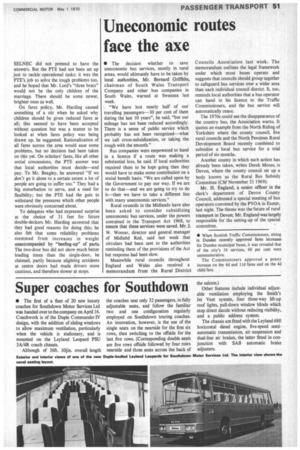Uneconomic routes face the axe
Page 53

If you've noticed an error in this article please click here to report it so we can fix it.
• The decision whether to save uneconomic bus services, mostly in rural areas, would ultimately have to be taken by local authorities, Mr. Bernard Griffiths, chairman of South Wales Transport Company and other bus companies in South Wales, warned at Swansea last week.
"We have lost nearly half of our travelling passengers-30 per cent of them during the last 10 years", he said, "but our mileage has not been reduced accordingly. There is a sense of public service which probably has not been recognized—what we ball cross-subsidization, or taking the rough with the smooth."
Bus companies were empowered to hand in a licence if a route was making a substantial loss, he said. If local authorities required them to be kept going then they would have to make some contribution on a social benefit basis. "We are called upon by the Government to pay our way. If we are to do that—and we are going to try to do it—then we have to take a different line with many uneconomic services."
Rural councils in the Midlands have also been asked to consider subsidizing uneconomic bus services, under the powers contained in the Transport Act 1968, to ensure that these services were saved. Mr. J. W. Womar, director and general manager of Midland Red, said last week that circulars had been sent to the authorities reminding them of the provisions of the Act but response had been slow.
Meanwhile rural councils throughout England and Wales also received a memorandum from the Rural District Councils Association last week. The memorandum outlines the legal framework under which most buses operate and suggests that councils should group together to safeguard bus services over a wider area than each individual council district. It, too, reminds local authorities that a bus operator can hand in his licence to the Traffic Commissioners, and the bus service will automatically cease.
The 1970s could see the disappearance of the country bus, the Association warns. It quotes an example from the North Riding of Yorkshire where the county council, five rural councils and the North Pennines Rural Development Board recently combined to subsidize a local bus service for a trial period of six months.
Another county in which such action has already been taken, writes Derek Moses, is Devon, where the county council set up a body known as the Rural Bus Subsidy Committee (CM November 211969).
Mr. H. England, a senior officer in the Clerk's department of Devon County Council, addressed a special meeting of bus operators convened by the EVOA in Exeter, last night. The theme was the future of rural transport in Devon; Mr. England was largely responsible for the setting-up of the special committee.
• When Scottish Traffic Commissioners, sitting in Dundee recently approved fares increases for Dundee municipal buses, it was revealed that of the city's 16 services, 60 per cent were unremunerative.
The Commissioners approved a penny increase on the 4d and I Id fares and on the 4d child fare.
















































































































































































































